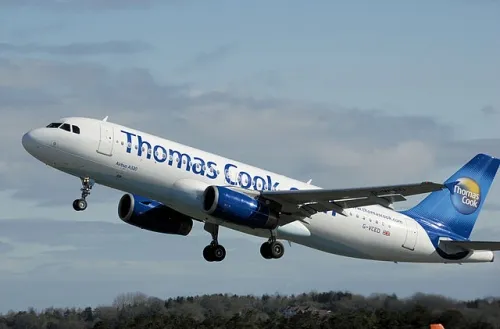
More than 150,000 stranded as Thomas Cook collapses
Sep 23, 2019

The sudden collapse of Thomas Cook has left over 150,000 holidaymakers stranded worldwide, facing uncertainty as flights and accommodations are abruptly canceled. The iconic travel company, which had been operating for nearly two centuries, succumbed to financial pressures and mounting debts. Passengers are now scrambling to find alternative travel arrangements, while governments and airlines work to repatriate those affected. Many travelers are expressing frustration and anxiety over the situation, as they navigate the challenges of returning home. The incident highlights the vulnerabilities within the travel industry and the impact of economic fluctuations on consumers and businesses alike.
Understanding the Impact of Thomas Cook's Collapse
The recent collapse of Thomas Cook has left more than 150,000 travelers stranded around the globe, raising significant concerns about the future of the travel industry. As one of the oldest and most recognized travel companies, Thomas Cook's sudden failure has sent shockwaves through the sector. This event highlights the fragility of the travel economy and the importance of being prepared for unexpected disruptions.
The Immediate Consequences for Travelers
For many, the collapse of Thomas Cook means canceled flights, lost hotel reservations, and a scramble for alternative travel arrangements. Stranded travelers are experiencing significant stress and uncertainty, as they navigate the challenges of returning home. The UK government has initiated a large-scale repatriation effort to bring back those affected, but the chaos continues to unfold.
Financial Ramifications of the Collapse
The financial implications of Thomas Cook's collapse are profound. With debts exceeding £1.5 billion, the company's failure has not only affected its employees and customers but has also sent ripples through the entire travel industry. Many suppliers, hotels, and airlines that relied on Thomas Cook for business are now facing financial strain. The following table outlines some of the financial impacts:
| Impact Area | Estimated Loss |
|---|---|
| Employee Layoffs | 9,000 jobs lost |
| Supplier Payments | Millions in unpaid invoices |
| Travel Industry Confidence | Low consumer confidence |
| Government Costs | £100 million for repatriation |
Long-Term Effects on the Travel Industry
The collapse of Thomas Cook may lead to long-lasting changes within the travel sector. With a significant player out of the market, competition dynamics will shift. Other travel companies may seize the opportunity to attract former Thomas Cook customers, but they will also need to navigate the changing landscape of consumer trust. Key trends to watch include:
- Increased Mergers and Acquisitions: Smaller travel agencies may look to merge with larger firms to bolster their market presence.
- Focus on Customer Service: Trust is essential, and travel companies will need to emphasize customer care and reliability.
- Innovation in Travel Solutions: The industry may see a rise in innovative solutions, such as flexible booking options and enhanced communication channels.
Preparing for Future Travel Disruptions
In light of Thomas Cook's collapse, travelers must be more vigilant than ever. Here are some essential tips for preparing for future travel disruptions:
1. Research Your Travel Provider
Before booking, ensure that your travel provider has a solid reputation and financial stability. Look for reviews and ratings from previous customers.
2. Consider Travel Insurance
Travel insurance can provide peace of mind and financial protection against unforeseen events. Make sure to read the policy details to understand what is covered.
3. Stay Informed
Keep updated on the latest news regarding your travel plans. Being informed can help you make quick decisions if changes occur.
4. Have Contingency Plans
Always have a backup plan in case your original travel arrangements fall through. This could include alternative flights, accommodations, or modes of transportation.
The Role of Digital Marketing in the Travel Sector
The collapse of Thomas Cook serves as a critical reminder of the importance of digital marketing in the travel industry. With more consumers relying on online platforms for booking travel, companies must invest in their online presence. Key areas of focus include:
- SEO Strategies: Optimize your website for search engines to increase visibility and attract potential travelers.
- Social Media Engagement: Use social media to connect with customers and provide real-time updates about travel offers and safety measures.
- Content Marketing: Create valuable content that informs and educates travelers, helping to build trust and authority in the industry.
Conclusion
The collapse of Thomas Cook is a stark reminder of the volatility within the travel industry. More than 150,000 travelers are currently facing the consequences, and the long-term effects on the industry are still unfolding. As companies adapt to the changing landscape, it is crucial for travelers to stay informed, prepared, and engaged with reliable travel providers. By prioritizing customer service and leveraging digital marketing strategies, the travel sector can rebuild trust and confidence in the wake of this significant disruption.
Related Articles

Explore Thailand: The Best Islands to Visit for Paradise, Adventure, and Relaxation

The Ultimate Guide to the Best Islands in Thailand for Your Next Getaway

Do babies need passports? How to get a passport for a newborn

How to get a U.S. passport fast: here’s how to expedite the process

What is Mobile Passport Control: 5 reasons why you should use it

SENTRI vs. Global Entry: A detailed guide

Do you need a passport to go to the Bahamas? Let’s find out

Do you need a passport to go to Mexico? A detailed guide

Do you need a passport to go to Canada? We got the answer

Do You Need a Passport for a Cruise: An Essential Travel Guide

Booster Seat Requirements: All the Rules to Follow in Your Rental Car

What Are the World’s Most Powerful Passports, and How Does Yours Rank?

How to Take a Passport Photo at Home: A Helpful Guide

You've got to have heart! Southwest's new livery

Your opinion: Should water be free on low cost carriers?

Young women bolder than guys as solo travellers
